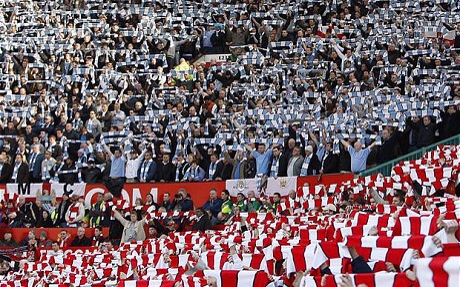Manchester is recognized internationally as a footballing city, with both Manchester United and Manchester City acknowledged as prominent clubs.
However, the city has not always been a force in the game, nor has the game always been important across Manchester’s social spectrum.
Researcher Gary James has pinpointed Manchester City’s defeat of Bolton in the 1904 FA Cup Final as the pivotal moment for Mancunian football fans, but says it was the clubs rather than the city council who encouraged the growth of football culture in the city.
Football in Manchester was not embedded in the city’s everyday life prior to the 1904 FA Cup success, it was mostly just the dedicated followers of the city’s main teams who paid notice to the game.
Indeed while by the early twentieth century, football in England had become a professional sport with a well-established national league of two divisions complementing the traditional FA Cup competition, within Manchester, however, success on the football field lagged behind its main economic and sporting rivals, Liverpool, Birmingham and Sheffield, and the Lancastrian town of Bury, less than eight miles from Manchester City centre, had won the FA Cup twice by 1903.
Bury FC, estab- lished in 1885, was a younger club than either Manchester United or Manchester United.City, who both staged their earliest reported games, under their original names Newton Heath (United) and St. Mark’s (City), in November 1880.
Despite success in local competitions, neither side was invited to the meetings which led to the for- mation of the Football League in 1888, despite the main meeting being held in Manchester,
But according to Gary, that all changed when Manchester City beat Bolton in the 1904 FA Cup final.
“The authorities didn’t know how to react to Manchester’s success and so arrangements for a homecoming were left to the club and fans.
“In the end the ‘whole population’ of Manchester turned out on a Monday night to welcome the players back at 9.30pm. This public demonstration made the authorities realise the significance of the sport but also caused Mancunians of every class to celebrate en masse.”
Gary’s research identifies that this public interest was converted into football involvement in the weeks, months and years that followed.
He documents how Manchester’s clubs had a broad range of admission prices, meaning there was an appropriate offering for every class of fan, and that the clubs improved their venues to accommodate the new found interest.
The number of football leagues and teams in the city grew at a rapid rate in the immediate aftermath of the 1904 FA Cup success, while pitch provision also improved.
The findings of this research, carried out with Gary’s colleague Dave Day in the Sports & Leisure History Group, has been published in the respected academic journal Soccer & Society in a paper titled: “FA Cup Success, Football Infrastructure and the Establishment of Manchester’s Footballing Identity.”
This research identifies the events and circumstances that established Manchester’s identity as a footballing city.
Gary said: “My aim with this research was to properly analyse the growth in interest in Manchester. When I set out I didn’t anticipate identifying how affordable the game was to Mancunians at this point but the further I explored the more I realised that Manchester’s football could only develop if the circumstances were right.”
Adding that
“The success was important but more significant was that Manchester’s clubs were prepared for the increase in interest, while hundreds of ordinary residents also put the time and effort in to establish their own clubs and leagues after seeing the positive effects of the game.
“I think it may surprise a few to know that Manchester City’s support contained a good mix of classes and that there were also female season ticket holders in 1904. Ticket prices ranged from the equivalent cost of 1.5 pounds of sugar through to the weekly rent of a terraced house in the Gorton district – a much broader range than many assume for this period.
“Football was open and available to all and that 1904 success led to the city being recognised for its strength of support and passion for the game. Over time both Manchester’s clubs were able to build on this and lay the foundations for Manchester’s position in the football world today.”








My full article can be read here: http://www.tandfonline.com/doi/full/10.1080/14660970.2014.961378